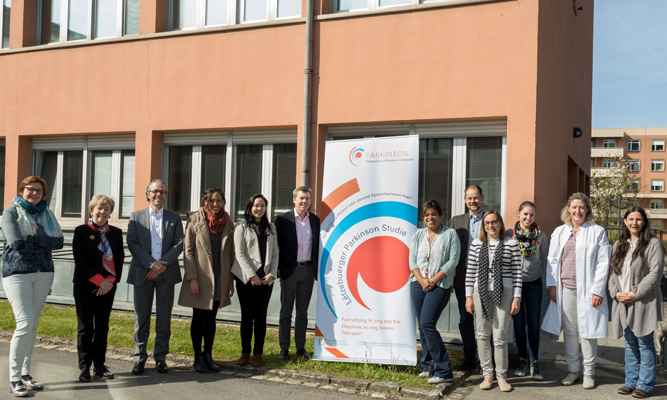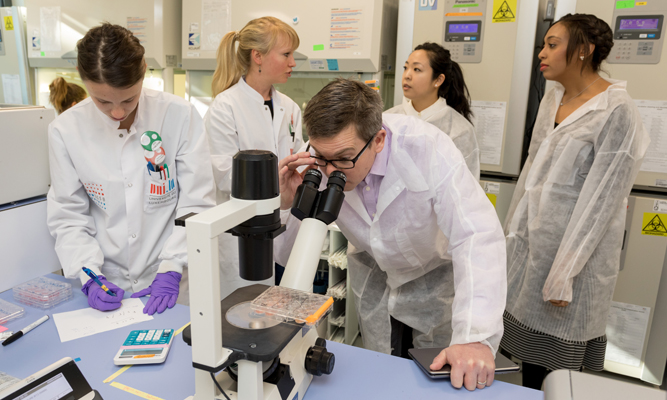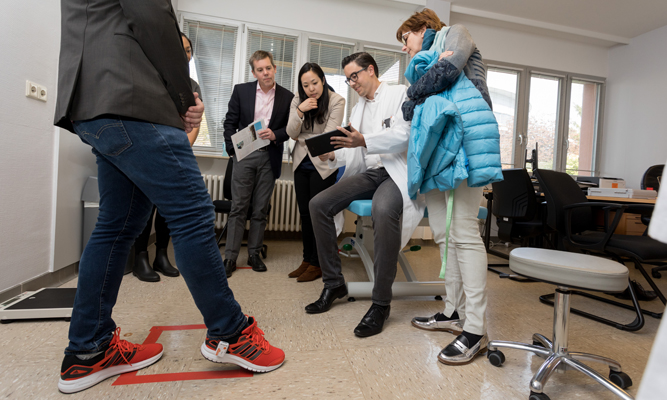Members of The Michael J. Fox Foundation for Parkinson’s Research (MJFF) visited the Luxembourg Centre for Systems Biomedicine (LCSB) of the University of Luxembourg, the Integrated Biobank of Luxembourg and the Parkinson Research Clinic on 21-22 April 2017.

MJFF is dedicated to finding a cure for Parkinson’s disease through an impressively funded research agenda and ensuring the development of improved therapies for those living with Parkinson’s today. To reach this aim, it connects philanthropists, academia, industry, clinicians and allied health care providers, and those living with Parkinson’s disease (PD) across the globe. The visit to Luxembourg allowed the members of MJFF to learn about Luxembourg’s research agenda in the field of Parkinson’s disease, to align strategies and further develop existing joint projects.
“We are honoured by the visit of members of the MJFF scientific staff as it indicates the strong integration of Luxembourg-based research into the ongoing international efforts on developing novel strategies for the diagnosis and treatment of Parkinson’s disease,” said Prof. Rejko Krüger, clinical coordinator of the National Centre of Excellence in Parkinson’s Disease (NCER-PD) research programme.
MJFF is working with the LCSB and partners from the Gladstone Institute of Neurology in San Francisco, USA on the identification of genetic factors modifying the risk for a common familial form of Parkinson’s disease, and this visit gave them a chance to learn about LCSB’s research activities for the first time on-site.
During their stay, the three guests were first welcomed at the LCSB on Campus Belval with presentations on the recent developments of the NCER-PD research programme. Discussions around clinical cohort design, data analytics and visualization as well as microbiome research showed the interdisciplinary approach of Luxembourg’s research team to find new biomarkers for diagnosis and patient stratification.

“Luxembourg’s unique selling point is its strength in biomedical informatics and computational modelling within the clinical study,” says LCSB-Director Prof. Rudi Balling. “By integrating these elements from the conception phase of the study, we can ensure not only the highest standards in data privacy and standardization but also a fast transition from data gathering to personalized models for patient stratification.”
Afterward the guests visited the Parkinson’s Research Clinic at the Centre Hospitalier de Luxembourg and the Integrated Biobank of Luxembourg – two institutions that play an essential role in the recruitment of patients to the Luxembourg Parkinson’s study as well as processing and storage of their provided data and samples.

“We are impressed with what has been developed in Luxembourg in such a short period of time,” said Mark Frasier, PhD, senior vice president of MJFF Research Programs, who was one of the visitors. “Seeing the university’s comprehensive dedication to Parkinson’s research first-hand has strengthened our collaboration toward our shared goals of better understanding of and a cure for this disease.”
The visitors particularly noted the strength of data analysis and systems biology capabilities at the LCSB, including the ability to handle high-dimensional data. The centre is preparing a joint project with Prof. Andreas Keller from Saarland University and MJFF on miRNA-based biomarkers in PD. The Luxembourg Parkinson’s cohort will serve as a validation tool.
“This shows that already today Luxembourg patients and control volunteers provide an important contribution to the advancement of international research efforts - this is a strong motivation for our study participants and all researchers involved in the NCER-PD,” concluded Prof. Krüger.




